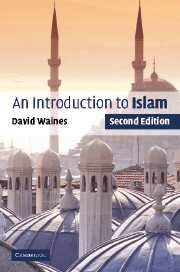Book contents
- Frontmatter
- Contents
- List of plates
- Preface and Acknowledgments
- Map
- Introduction
- PART 1 FOUNDATIONS
- 1 “There is no god but Allah…”
- 2 Tradition in the making
- PART 2 ISLAMIC TEACHING AND PRACTICE
- PART 3 ISLAM IN THE MODERN WORLD
- Excursus on Islamic origins
- Glossary
- Notes
- Further reading
- Index
- Plate section
1 - “There is no god but Allah…”
Published online by Cambridge University Press: 05 October 2014
- Frontmatter
- Contents
- List of plates
- Preface and Acknowledgments
- Map
- Introduction
- PART 1 FOUNDATIONS
- 1 “There is no god but Allah…”
- 2 Tradition in the making
- PART 2 ISLAMIC TEACHING AND PRACTICE
- PART 3 ISLAM IN THE MODERN WORLD
- Excursus on Islamic origins
- Glossary
- Notes
- Further reading
- Index
- Plate section
Summary
TIME, ETERNITY AND THE GODS
The religious and moral values of the ancient Arabs are mirrored, however partially, in the verses of their poets. Among them was Zuhayr b. Abi Salma, who flourished in the last days of paganism before the emergence of Islam in central Arabia in the seventh century. Toward the end of a long and often turbulent life he recorded these cautionary words in a famous ode:
Do not conceal from
Allah whatever is in
your breasts hoping it
may be hidden. Allah
knows whatever is
concealed.
Zuhayr was reflecting upon the attempts of conciliators to terminate an eruption of inter-tribal bloodshed. Traditional accounts portray these conflicts, the so-called Days of the Arabs, as a common feature of Arabian society of the period. His warning to each side in the conflict was to enter an agreement in good faith, for the inevitable consequence of deception would be punishment of the betrayer.
The poet's reference to Allah (al-ilah = the God) contradicted neither his pagan values nor the poem's pessimistic pagan ethos. Elsewhere he remarks,
It is evident that men perish,
they and their property, but I do not
see Time perish. I see nothing that
remains and is eternal against events
except the rooted mountains and the
sky and the countries, and our Lord,
and the days that are counted and the
nights.
- Type
- Chapter
- Information
- An Introduction to Islam , pp. 7 - 32Publisher: Cambridge University PressPrint publication year: 2003



